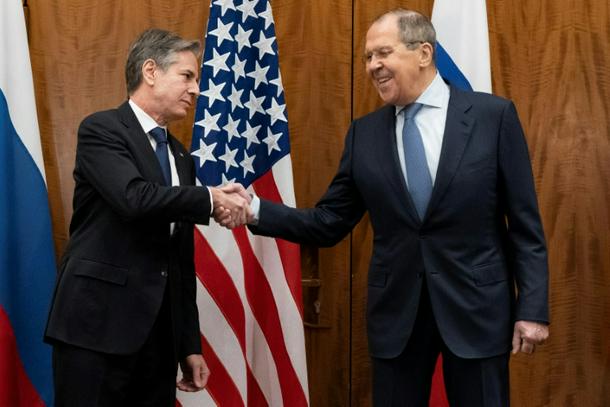
US Secretary of State Antony Blinken met Russian Foreign Minister Sergei Lavrov in Geneva last week
Brussels (AFP) - Top US diplomat Antony Blinken and European ministers were preparing Monday what they vowed would be a tough response to any Russian incursion into Ukraine, as Kyiv complained that Washington’s decision to withdraw diplomatic families was “premature”.
Tensions are soaring over Russia’s deployment of some 100,000 troops at its neighbour’s borders, and Britain followed the US and sent home some staff and their relatives from its embassy in Kyiv. Moscow insists it has no intention of invading.
The US is trying to marshal its allies to prepare an unprecedented package of sanctions for Moscow if its sends in its forces – and European Union members insist they could hit the Kremlin with “massive consequences” in days if needed.
But there remain divisions over the extent of any punishment for Moscow and how imminent the threat of military action could be.
Blinken will dial in to a meeting of EU counterparts in Brussels to brief them on his talks Friday with Russian Foreign Minister Sergei Lavrov, where the two sides failed to make a major breakthrough but agreed to keep working to ease tensions.
EU foreign ministers will sound out Blinken over a written response Washington has committed to provide to Moscow this week after the Kremlin laid down a series of security demands that would stop Ukraine joining NATO and roll back Washington’s influence in eastern Europe.
Ahead of the latest week of talks, Washington on Sunday ordered the families of its diplomats to leave Ukraine and authorised the “voluntary” departure of non-essential embassy staff.
Ukraine’s foreign ministry decried the move as “premature” and insisted there had been no “no radical changes” recently in security conditions.
The EU’s foreign policy chief Josep Borrell said the bloc had no plans to pull people out yet, adding there was no need to “dramatise” the situation while talks with Russia continued.
- React ‘forcefully’ -
The EU – in consultation with the US and other allies – is pushing to put together a package of sanctions against Moscow that it hopes will help deter Russia from any military action.
Foreign ministers are not expected to give approval to any options for sanctions on Monday, but an EU source said Russia’s mammoth oil and gas supplies to Europe could be targeted.
“There’s no doubt we are ready to react forcefully with comprehensive sanctions – never seen before,” Danish Foreign Minister Denmark FM Jeppe Kofod said.
The 27-nation bloc faces a complex task compiling its raft of measures as its members have starkly differing approaches and ties to Russia.
The new government in economic powerhouse Germany has faced criticism from Kyiv over its refusal to send arms to Ukraine and hesitation over calls to cut Moscow from the global SWIFT payment system.
German Foreign Minister Annalena Baerbock insisted any further aggression from Moscow would get a “clear response” from Europe and talked up economic support Berlin gives Kyiv.
The West is struggling to work out at what point Russian actions would trigger the sweeping response it has threatened – after US President Joe Biden spoke of a “minor incursion” last week.
Britain, which left the EU at the end of 2020, ramped up the rhetoric with Moscow over the weekend by alleging it had information the Kremlin was seeking to install a “pro-Russian” leader in Kyiv.
The current fears of a Russian invasion follow Moscow’s 2014 annexation of Crimea from Ukraine.
Kyiv is already fighting a low-level conflict with Russian-backed rebels controlling a chunk of the east of the country that has claimed 13,000 lives in the past eight years.